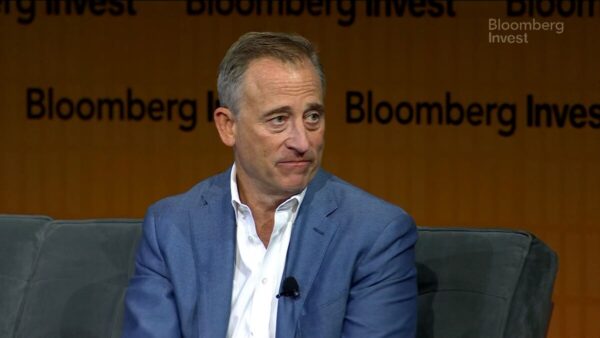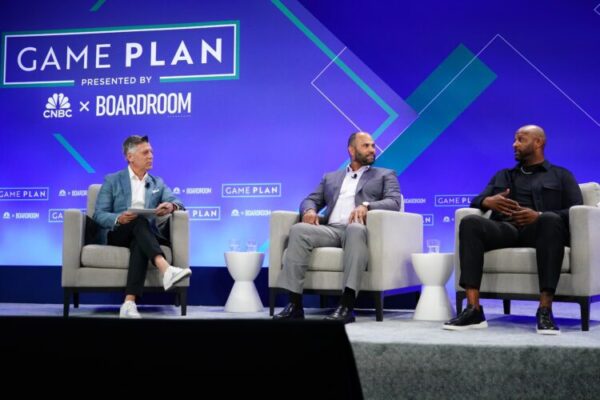When Kevin Durant and Rich Kleiman convened their Boardroom GAMEPLAN Summit at the Fairmont Santa Monica—produced in partnership with CC’s Sports Innovation Conference—the city became the epicenter of sports, business, and culture. The duo brought together some of the industry’s most influential power players, including NHL Commissioner Gary Bettman, Washington Commanders owner Josh Harris, Big East Commissioner Val Ackerman, ACC’s Jim Phillips, Big 12’s Brett Yormark, and CNBC’s Scott Wapner.
“This summit is about ownership—of your story, your business, and your future,” Kleiman told the audience, framing the day’s intent. Durant added, “Athletes aren’t waiting anymore—we’re building while we play.”
From franchise valuations and private equity to college sports realignment, women’s sports, and the cultural power of tech and media, the conversations underscored how the future of sports will be defined far beyond the field of play.

NHL commissioner Gary Bettman
GARY BETTMAN: THE LONG GAME OF THE NHL
Bettman’s tenure as NHL commissioner has outlasted most careers, and his perspective reflected that durability. “Franchise valuations are rising because live sports are the last appointment viewing in media,” he told the room, underscoring the premium that networks and streaming platforms still place on hockey.
He confirmed that NHL players will return to the Olympics:
“We’ll pause our season to let the best players in the world compete on the biggest stage. It’s good for the game and for global visibility.”
On expansion, Bettman was firm but cautious. Cities like Austin, Houston, and Atlanta may have buzz, but “ownership quality, arena readiness, and market strength will always be the criteria,” he said.
And in a nod to changing fan behaviors, Bettman addressed gambling and tech. “We went from opposing gambling to recognizing it as an engagement tool. The key is integrity and protecting consumers.” His focus on player tracking, alternate broadcasts, and music integrations made clear: The NHL is betting on Gen Z.

Team Owner Josh Harris
JOSH HARRIS: STEWARDSHIP OVER SPECULATION
Few embody the convergence of ownership and investment like Josh Harris, who has stakes in the Commanders, 76ers, Devils, and more. His message to the room was simple: Sports ownership isn’t about flipping—it’s about stewardship.
“This is not about flipping assets. It’s about building infrastructure, strengthening communities, and enhancing the fan experience,” Harris said.
Private equity (PE), he acknowledged, is a growing force. “PE is here to stay, but it has to be structured with patience. Long-dated funds make sense because sports franchises aren’t built for quick exits.”
Harris also emphasized the central role of infrastructure. “Mixed-use districts—places like Navy Yard in D.C. or Belmont in New York—are what drive value and reconnect franchises with their fans.”
On tech, Harris struck a humanist chord: “Analytics can supercharge efficiency, but human scouting remains irreplaceable. The best approach is integration, not substitution.”
COLLEGE SPORTS AT A CROSSROADS
The college sports panel was perhaps the most charged, with commissioners Val Ackerman (Big East), Jim Phillips (ACC), and Brett Yormark (Big 12) facing questions about money, equity, and future governance.
Phillips defended the ACC’s decision to embrace performance-based revenue sharing: “We’re rewarding success in football and basketball while ensuring Olympic sports remain protected.” Yormark countered that the Big 12 is holding back: “The Big 12 isn’t adopting revenue sharing just yet. Our priority is stability and integration after expansion.”
Ackerman spoke directly to the pressures of outside capital. “We have to be cautious when outside capital comes in—if the primary intent is just to fund player pay, that’s not sustainable.”
She also highlighted what may be the next frontier: volleyball.
“It’s the fastest-growing in engagement and media value,” Ackerman said. “The upside is tremendous.”
The discussion also circled Title IX, with all commissioners acknowledging that courts—or even Congress—may need to provide clarity. “We are committed to broad-based programming and equitable treatment,” Ackerman stressed. “No one is talking about cutting sports.”

Durant with co-speakers at the 2025 Game Plan Summit
SANTA MONICA AS A SYMBOL
The choice of Santa Monica was symbolic. With Los Angeles preparing for the 2028 Olympics, and as a hub where entertainment, sports, and tech collide, the city is both a backdrop and a laboratory. The summit wasn’t just about where leagues or franchises are headed—it was about where global culture is headed.
Rich Kleiman, Durant’s longtime partner in Boardroom, captured it well: “This summit is about ownership—of your story, your business, and your future. We want athletes, investors, and commissioners to walk away thinking not just about today’s game, but about the next generation of opportunities.”
As I looked around that room in Santa Monica—commissioners on one side, artists on the other, investors and athletes everywhere in between—I realized this wasn’t just a summit. It was a map of where our culture is headed.
The future of sports and business won’t be measured in wins or losses alone. It will be measured in ownership, equity, and ecosystems. And as a builder and culture architect, I know this: The work of shaping that future doesn’t happen on the sidelines—it happens in rooms like this.
MY TAKEAWAYS AS A BUILDER
What I carried away from the GAMETIME Summit reinforces why I lean into this work every day:
- Live sports remains the crown jewel: Fragmented media only elevates its value.
- Ownership models are evolving: Private equity and real estate are reshaping the landscape.
- College sports are at an inflection point: Revenue-sharing, Title IX, and realignment will define the decade.
- Women’s sports are ascendant: Volleyball and softball are poised for breakout growth.
Culture is capital: The intersection of sports, music, tech, and community is where the future will be built.
As a visionary executive, legal strategist, and cultural architect, Michelle has a proven track record leading at the intersection of entertainment, sports, media, and government.













































